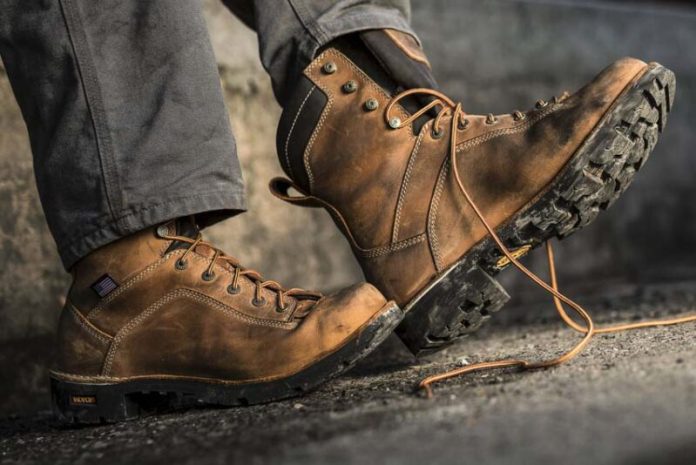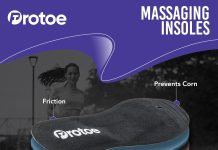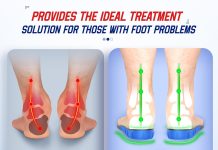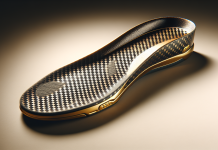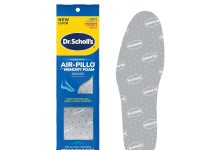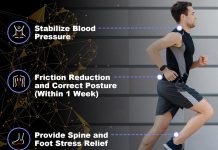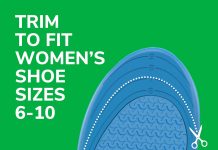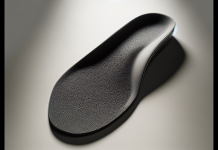Finding the right insoles for your work boots or safety shoes can improve your comfort and overall foot health.
Whether you spend long hours on your feet or work in hazardous environments, the right insoles can provide the necessary support, cushioning, and protection.
But with so many options available, knowing which insoles are the best fit for your specific needs can be overwhelming. In this article, we will explore different types of insoles and provide recommendations to help you choose the right ones for your work boots or safety shoes.
Factors to Consider When Choosing Insoles for Work Boots or Safety Shoes
When it comes to selecting the right insoles for your work boots or safety shoes, there are several factors that you should consider. By taking these factors into account, you can ensure that you choose the insoles that provide the best support, comfort, and protection for your feet. Let’s explore each factor in detail to help you make an informed decision.
Type of Work
The type of work you do is crucial in determining the insoles you need. Different occupations require different levels of support and protection for the feet. For example, suppose you work in construction or engage in heavy-duty work that involves standing on hard surfaces for long periods. In that case, you may need insoles with enhanced cushioning and shock absorption. On the other hand, if you work in a healthcare profession, you may require insoles that offer excellent arch support and moisture-wicking properties.
Foot Condition
Understanding your foot condition is essential in choosing the right insoles. Whether you have flat feet, high arches, overpronation, or any other foot condition, there are specialized insoles available to address your specific needs. Insoles designed for flat feet provide proper arch support, while insoles for high arches offer increased cushioning. Selecting insoles that align with your foot condition is crucial to promote proper foot mechanics and prevent discomfort or pain.
Arch Support
Arch support is one of the key features to consider when selecting insoles for work boots or safety shoes. The arches of your feet help distribute your body weight evenly and provide stability. Insoles with arch support help maintain the natural alignment of your feet and alleviate stress on the arches. If you have flat feet or high arches, make sure to choose insoles that offer the appropriate level of support for your arch type.
Cushioning
Work boots or safety shoes often lack sufficient cushioning to absorb the impact of daily activities. This is where insoles come in handy. Look for insoles that provide adequate cushioning to reduce the pressure on your feet during prolonged periods of standing or walking. Cushioned insoles can also help alleviate discomfort caused by conditions like plantar fasciitis or metatarsalgia.
Shock Absorption
Insoles with shock absorption properties are particularly beneficial if you work in an environment that involves heavy impact or repetitive motions. Shock-absorbing insoles help cushion your feet against hard surfaces and minimize the strain on your joints. They are instrumental in occupations such as construction, where the risk of foot and leg fatigue is high.
Moisture-Wicking
If your work environment exposes your feet to moisture or excessive sweating, moisture-wicking insoles can be a game-changer. These insoles have breathable properties that allow moisture to evaporate, keeping your feet dry and comfortable throughout the day. Additionally, moisture-wicking insoles help prevent the formation of odor-causing bacteria, keeping unpleasant foot odor at bay.
Anti-Odor Properties
If foot odor concerns you, consider insoles that have anti-odor properties. These insoles are made with materials resistant to odor-causing bacteria and fungi. Using insoles with anti-odor properties, you can keep your work boots or safety shoes fresh-smelling, even after extended wear.
Durability
Durability is essential when investing in insoles for work boots or safety shoes. You want insoles that can withstand the demands of your job and daily wear. Look for insoles made from high-quality materials that are built to last. Durable insoles not only provide long-lasting support but also offer good value for your money.
Correct Fit
Choosing the correct fit for your insoles is crucial in maximizing their effectiveness. Insoles that are too small or too large can cause discomfort and compromise performance. Take accurate measurements of your feet and select insoles corresponding to your shoe size. Sometimes, you may need to trim the insoles to ensure a perfect fit. It is also essential to consider the thickness of the insoles and how they fit within your work boots or safety shoes.
Brand Reputation
The brand’s reputation is another factor when selecting insoles for your work boots or safety shoes. Trusted brands often have a track record of producing high-quality products known for their comfort and durability. Do your research, read reviews, and consider recommendations from friends or colleagues who have had positive experiences with specific brands. Opting for reputable brands can give you peace of mind and confidence in purchasing.
Different Types of Insoles for Work Boots or Safety Shoes
Now that we have explored the factors to consider when choosing insoles let’s delve into the insoles available for work boots or safety shoes. Each type of insole offers unique features and benefits, catering to various foot conditions and work environments. Understanding the characteristics of each type can help you narrow down your options and select the insoles that best suit your needs.
Gel Insoles
Gel insoles are made from a soft, flexible gel material that provides excellent cushioning and shock absorption. These insoles are known for distributing pressure evenly across the foot, reducing discomfort and fatigue. Gel insoles benefit individuals with plantar fasciitis or metatarsalgia, offering superior impact protection.
Memory Foam Insoles
Memory foam insoles contour to the shape of your feet, providing customized support and cushioning. They offer excellent shock absorption and pressure relief, making them suitable for individuals who spend long hours standing or walking. Memory foam insoles help alleviate foot and leg fatigue by adapting to the unique contours of your feet.
Orthotic Insoles
Orthotic insoles are designed to support the natural alignment of your feet and correct any biomechanical abnormalities. These insoles offer exceptional arch support and promote proper foot mechanics. Orthotic insoles are ideal for individuals with flat feet, high arches, or overpronation, as they help reduce pain and discomfort associated with these conditions.
EVA Foam Insoles
EVA foam insoles are lightweight and provide excellent shock absorption. They are highly versatile and suitable for a wide range of work environments. EVA foam insoles offer a balance of cushioning and support, making them a popular choice among individuals who require general foot comfort without specific orthotic needs.
Anti-Fatigue Insoles
As the name suggests, anti-fatigue insoles are designed to combat foot and leg fatigue caused by prolonged periods of standing or walking. These insoles feature advanced cushioning and energy-returning properties, helping to reduce the strain on your feet. Anti-fatigue insoles can significantly boost comfort and productivity during long work shifts.
Active Carbon Insoles
Active carbon insoles are known for their odor-absorbing properties. These insoles have activated carbon particles embedded within them, which help neutralize and eliminate foot odor. Active carbon insoles are an excellent option if you are prone to sweaty feet or work in environments promoting bacterial growth and odor development.
Dual-Layered Insoles
Dual-layered insoles offer a combination of cushioning, support, and shock absorption. They typically have a firmer base layer for stability and a softer top layer for enhanced comfort. These insoles are suitable for individuals who require arch support and cushioning, as they balance structure and softness.
Heat-Moldable Insoles
Heat-moldable insoles are designed to conform to the shape of your feet. By heating the insoles and wearing them during the molding process, you can achieve a customized fit that offers optimal support and comfort. Heat-moldable insoles are highly recommended for individuals with specific foot conditions or requiring maximum support.
Metatarsal Insoles
Metatarsal insoles are specifically designed to provide support and alleviate pain in the metatarsal area of the foot. These insoles have a raised cushion or pad at the forefoot, which helps cushion and distribute pressure evenly across the metatarsal bones. Metatarsal insoles can provide targeted relief if you experience pain or discomfort in the ball of your foot.
Steel Toe Insoles
Steel toe insoles are engineered to protect the toes in work boots or safety shoes. These insoles have a reinforced toe cap made of steel or composite materials, which helps guard against impact and compression. Steel toe insoles are essential for individuals working in environments where toe protection is required.
Specialized Insoles for Specific Work Conditions
Apart from considering your foot condition, choosing insoles tailored to your specific work conditions is essential. Different occupations and work environments place unique demands on your feet, requiring specialized insoles to ensure optimal comfort and protection. Let’s explore some specialized insoles for specific work conditions.
Construction and Heavy-Duty Work
Construction and heavy-duty work involve prolonged standing, walking on uneven surfaces, and exposure to heavy loads. Insoles for these work conditions should have excellent shock absorption, cushioning, and durability. Look for insoles that can withstand rugged environments and provide ample support to prevent foot fatigue and injuries.
Standing or Walking on Hard Surfaces
If your work requires prolonged standing or walking on hard surfaces such as concrete or tile floors, selecting insoles with superior cushioning and shock absorption properties is crucial. These insoles help reduce the impact of each step and minimize the strain on your feet, legs, and lower back. Opt for insoles that provide exceptional comfort and distribute pressure evenly across the foot.
Cold Weather or Insulated Work
Cold weather or insulated work often involves exposure to low temperatures and harsh conditions. Insoles for these work conditions should prioritize warmth and insulation. Look for insoles with insulating materials such as wool or synthetic fibers to keep your feet warm and comfortable, even in freezing temperatures.
Electrical Hazard Protection
If you work in an environment where you are at risk of electrical shocks or hazards, it is crucial to invest in insoles that offer electrical hazard protection. These insoles have built-in features to reduce the risk of static electricity buildup and provide a level of insulation from electric shock. Always prioritize safety when working in such environments.
Oil and Slip-Resistant Work
Insoles for occupations that work with oils, chemicals, or slippery surfaces should have oil and slip-resistant properties. These insoles are made from materials that provide excellent traction and grip, reducing the risk of slips, trips, and falls. Choosing insoles with oil and slip-resistant properties can enhance workplace safety.
Heat and Fire-Resistant Work
Certain occupations expose you to heat or fire hazards, such as welding or firefighting. Insoles for these work conditions should be heat and fire-resistant to provide additional protection. Look for insoles made from materials that can withstand high temperatures and offer flame-resistant properties.
Wet or Moisture-Prone Environments
If you work in wet or moisture-prone environments, it is crucial to choose insoles that are moisture-wicking and quick-drying. These insoles will help keep your feet dry and comfortable, reducing the risk of blisters and fungal infections. Look for insoles with moisture-wicking fabrics or perforations that allow for breathability.
Anti-Static or ESD Protection
In specific work environments, such as electronics manufacturing or laboratories, the buildup of static electricity can pose a significant risk. Insoles with anti-static or electrostatic discharge (ESD) protection are designed to dissipate static electricity safely. These insoles help protect sensitive electronic equipment and ensure the safety of workers in such highly static environments.
Healthcare or Nursing Professions
Healthcare and nursing professions often require long hours of standing and walking on hard surfaces. Insoles for these professions should provide excellent arch support and cushioning to alleviate foot and leg fatigue. Additionally, these insoles should have moisture-wicking properties to keep feet dry, as healthcare professionals are often exposed to various bodily fluids.
Sporting and Outdoor Activities
If your work involves sporting or outdoor activities, it is crucial to select insoles that can withstand the demands of your activities. Insoles designed for sports or outdoor use offer enhanced shock absorption, stability, and support. They are often made from durable materials that can withstand the rigors of running, hiking, or other physically demanding activities.
Insoles for Specific Foot Conditions
In addition to specialized insoles for specific work conditions, it is essential to consider insoles that cater to specific foot conditions. Different foot conditions require different levels of support, cushioning, and alignment. Let’s explore some common foot conditions and the corresponding insoles that can help alleviate their symptoms.
Flat Feet or Fallen Arches
Flat feet or fallen arches occur when the arches of the feet collapse, causing the entire sole to touch the ground. Individuals with flat feet often require insoles with firm arch support to maintain proper foot alignment and reduce stress on the arches. Look for insoles designed for flat feet or fallen arches to provide the necessary support and prevent discomfort.
High Arches
High arches refer to abnormally raised arches, causing excessive pressure on the balls and heels of the feet. Individuals with high arches require extra cushioning and shock absorption insoles to distribute pressure evenly across the feet. Insoles designed for high arches offer enhanced arch support and cushioning to alleviate pain and discomfort.
Overpronation
Overpronation occurs when the feet roll inward excessively while walking or running. This can lead to misalignment and discomfort. Insoles for overpronation provide stability and correct foot positioning to promote proper pronation. These insoles often include features such as arch support and heel stabilization to help restore the natural alignment of the feet.
Plantar Fasciitis
Plantar fasciitis is a common foot condition that causes pain and inflammation in the plantar fascia, a band of tissue that runs along the bottom of the foot. Insoles for plantar fasciitis offer targeted arch support and heel cushioning to relieve pressure on the plantar fascia. These insoles can help reduce pain and promote proper foot mechanics during everyday activities.
Metatarsalgia
Metatarsalgia refers to pain and inflammation in the ball of the foot. Insoles for metatarsalgia often have a cushioned forefoot area to relieve pressure and distribute weight evenly across the metatarsal bones. These insoles provide targeted support and shock absorption to help alleviate pain and discomfort caused by metatarsalgia.
Bunions
Bunions are bony protrusions that develop at the base of the big toe, often causing discomfort and pain. Insoles for bunions have a wider toe box and extra padding to reduce pressure on the affected area. These insoles help accommodate the bunion and prevent the rubbing or irritation that can exacerbate symptoms.
Achilles Tendonitis
Achilles tendonitis is the inflammation of the Achilles tendon, which connects the calf muscles to the heel bone. Insoles for Achilles tendonitis provide cushioning and support to reduce strain on the tendon. These insoles often have a raised heel cup and shock-absorbing properties to alleviate pain and promote proper healing.
Heel Spur
Heel spurs are bony growths that develop on the underside of the heel bone, often leading to heel pain. Insoles for heel spurs offer extra cushioning and shock absorption to reduce pressure on the heel. These insoles typically have a deep heel cup and extra padding in the heel area to alleviate discomfort caused by heel spurs.
Neuropathy
Neuropathy is nerve damage that can cause numbness, tingling, or foot pain. Insoles for neuropathy often have extra cushioning and padding to provide a soft and supportive surface for sensitive feet. These insoles are designed to reduce pressure on the nerves and minimize discomfort for individuals with neuropathy.
Diabetic Foot Conditions
Individuals with diabetes often have unique foot care needs due to the risk of circulatory issues and neuropathy. Insoles for diabetic foot conditions prioritize pressure redistribution and padding to minimize the risk of foot ulcers and other complications. These insoles typically have gentle arch support and cushioning to promote foot health and prevent potential injuries.
Popular Brands of Insoles for Work Boots or Safety Shoes
With numerous brands available in the market, it can be overwhelming to choose the right insoles for your work boots or safety shoes. To help make your decision easier, here are some popular brands known for their quality and performance in providing insoles for workwear:
Dr. Scholl’s
Dr. Scholl’s is a well-known brand that offers a wide range of insoles designed for various foot conditions and work environments. Their insoles are crafted using innovative technologies and premium materials to provide exceptional comfort, support, and durability. Dr. Scholl’s insoles are often recommended by healthcare professionals and trusted by consumers worldwide.
Superfeet
Superfeet is a trusted brand specializing in high-quality insoles that improve foot health and performance. Their insoles are engineered to provide optimal arch support, shock absorption, and stability. Superfeet insoles are popular among athletes and individuals seeking long-lasting comfort and pain relief.
Sof Sole
Sof Sole is known for its affordable yet reliable insoles for various work environments. Their insoles offer cushioning, support, and moisture-wicking properties to keep feet comfortable throughout the day. Sof Sole insoles are a popular choice among individuals looking for budget-friendly options without compromising on quality.
Timberland PRO
Renowned for their high-quality work boots, Timberland PRO also offers a selection of insoles designed to complement their footwear. Timberland PRO insoles are built for durability, comfort, and optimal foot support, ensuring that your work boots provide all-day protection and comfort.
Spenco
Spenco is a brand that focuses on foot health and offers a variety of insoles designed for specific foot conditions and work requirements. Their insoles are made from high-quality materials and provide excellent cushioning, support, and shock absorption. Spenco insoles are known for their durability and ability to alleviate foot pain and discomfort.
Powerstep
Powerstep is a trusted brand known for its orthotic insoles that provide exceptional support and stability. Their insoles are designed to correct improper foot alignment and alleviate pain associated with various foot conditions. Podiatrists and healthcare professionals often recommend power step insoles for their compelling orthotic features.
Red Wing Heritage
Red Wing Heritage is a reputable brand that offers insoles specifically designed for their line of work boots. These insoles are crafted with high-quality materials to provide superior comfort, support, and longevity. Aligning perfectly with Red Wing Heritage work boots, their insoles enhance the overall fit and performance of the footwear.
Wolverine
Wolverine is a well-established brand known for its rugged work boots and footwear accessories. Their insoles are designed to maximize comfort, cushioning, and shock absorption, ensuring that your feet remain comfortable during physically demanding work—professionals in industries such as construction and manufacturing favor wolverine insoles.
Carhartt
Carhartt, a brand famous for its durable and rugged workwear, also offers insoles to complement their line of footwear. Carhartt insoles are built to withstand harsh conditions and provide maximum support, cushioning, and shock absorption. These insoles are an excellent choice for individuals seeking durable and reliable foot support.
New Balance
New Balance is a trusted name in athletic footwear, and they also offer insoles designed for work boots and safety shoes. New Balance insoles are engineered with cutting-edge technologies to provide superior comfort, stability, and shock absorption. Their insoles are widely recognized for their quality craftsmanship and adaptability to unique foot conditions.
Tips for Proper Insole Maintenance and Replacement
It is essential to follow proper maintenance and replacement practices to keep your insoles in optimal condition and ensure they continue to provide the support and comfort you need. Here are some tips to help you maintain your insoles effectively:
Regular Cleaning and Drying
Cleaning your insoles regularly is crucial in preventing the buildup of odor-causing bacteria and maintaining hygiene. Follow the manufacturer’s instructions for cleaning your specific insoles. Insoles made from moisture-wicking materials can often be simply wiped clean with a damp cloth. Allow the insoles to air dry thoroughly before placing them back in your work boots or safety shoes.
Proper Storage
When not in use, it is essential to store your insoles properly to protect them from damage. Keep them in a cool, dry place away from direct sunlight or extreme temperatures. Storing your insoles in a ventilated container or the original packaging can help prevent deformation or exposure to moisture or dust.
Replacing Insoles Periodically
Insoles, like any other footwear component, have a limited lifespan. Eventually, they will wear out and lose their ability to provide adequate support and cushioning. It is recommended to replace your insoles every six to twelve months, depending on the frequency and intensity of use. Regularly inspect your insoles for signs of wear and tear, such as flattening, cracking, or lack of cushioning.
Observing Signs of Wear and Tear
Keep an eye out for signs that indicate your insoles need replacement. If you notice visible wear on the insoles, such as thinning or deterioration, it’s time to invest in new ones. Additionally, if you experience increased foot discomfort or pain, it may be a sign that your insoles are no longer providing the necessary support and cushioning.
Consulting Podiatrists or Orthopedic Specialists
If you have specific foot conditions or chronic foot pain, consulting a podiatrist or orthopedic specialist may be beneficial. These medical professionals can provide personalized recommendations and help determine the correct type of insoles for your specific needs. They may also suggest custom-made insoles if your foot condition requires a higher level of support and correction.
Using Insoles in Multiple Pairs of Work Boots or Safety Shoes
If you have multiple pairs of work boots or safety shoes, consider using your insoles interchangeably. This allows your insoles to air out and recover their shape, improving their longevity. Just make sure the insoles fit properly in each pair of footwear and do not cause discomfort or compromise performance.
Custom-Made Insoles for Severe Foot Conditions
If you have severe foot conditions that cannot be adequately addressed with off-the-shelf insoles, consider investing in custom-made insoles. Custom-made insoles are specifically crafted to meet your unique foot shape and address your specific foot condition. These insoles can provide maximum support, comfort, and alignment for individuals with severe foot problems.
Breaking-In New Insoles Properly
When you purchase new insoles, you must allow your feet to adjust to them gradually. Breaking in new insoles properly can prevent discomfort or blisters. Start by wearing the new insoles for a few hours each day and gradually increase the duration until your feet become accustomed to them. It is expected to experience slight discomfort initially, but if the discomfort persists or worsens, consider consulting a healthcare professional.
Using Insoles in Combination with Appropriate Work Socks
To optimize the performance of your insoles, it is recommended to pair them with appropriate work socks. Look for socks made from moisture-wicking materials to enhance ventilation and keep your feet dry throughout the day. Proper socks can complement the moisture-wicking properties of your insoles and prevent excessive sweating and odor buildup.
Adjusting Lacing or Fastening Techniques for Optimal Insole Fit
To ensure your insoles fit properly and do not shift around inside your work boots or safety shoes, adjust the lacing or fastening techniques accordingly. Tighten the laces or straps to secure the insoles in place, preventing unwanted movement. A snug fit between your feet, insoles, and footwear is essential for optimal support and performance.
By considering these tips, you can maintain the longevity and functionality of your insoles, ensuring they continue to provide the support and comfort you need throughout your workday. Regular maintenance and replacement are vital to ensuring your insoles perform at their best and help prevent foot pain and discomfort.
Conclusion
Choosing the right insoles for your work boots or safety shoes is essential in providing the necessary support, comfort, and protection for your feet. By considering factors such as your specific foot condition, work environment, and desired features, you can narrow down your options and make an informed decision.
Whether you require specialized insoles for specific work conditions or prefer insoles that cater to your foot condition, numerous options are available.
Top brands known for their quality and performance, such as Dr. Scholl’s, Superfeet, and Sof Sole, offer a wide range of insoles to suit your needs. Remember to properly maintain your insoles through regular cleaning, adequate storage, and timely replacement.
By following these guidelines and making informed choices, you can ensure maximum comfort, support, and longevity from your insoles, allowing you to focus on your work with confidence and ease.

